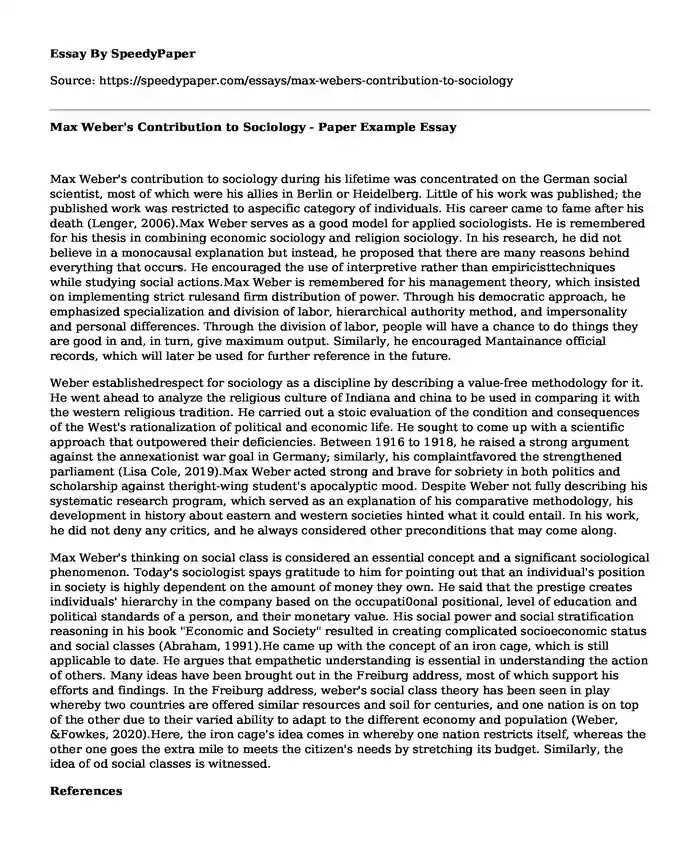Max Weber's contribution to sociology during his lifetime was concentrated on the German social scientist, most of which were his allies in Berlin or Heidelberg. Little of his work was published; the published work was restricted to aspecific category of individuals. His career came to fame after his death (Lenger, 2006).Max Weber serves as a good model for applied sociologists. He is remembered for his thesis in combining economic sociology and religion sociology. In his research, he did not believe in a monocausal explanation but instead, he proposed that there are many reasons behind everything that occurs. He encouraged the use of interpretive rather than empiricisttechniques while studying social actions.Max Weber is remembered for his management theory, which insisted on implementing strict rulesand firm distribution of power. Through his democratic approach, he emphasized specialization and division of labor, hierarchical authority method, and impersonality and personal differences. Through the division of labor, people will have a chance to do things they are good in and, in turn, give maximum output. Similarly, he encouraged Mantainance official records, which will later be used for further reference in the future.
Weber establishedrespect for sociology as a discipline by describing a value-free methodology for it. He went ahead to analyze the religious culture of Indiana and china to be used in comparing it with the western religious tradition. He carried out a stoic evaluation of the condition and consequences of the West's rationalization of political and economic life. He sought to come up with a scientific approach that outpowered their deficiencies. Between 1916 to 1918, he raised a strong argument against the annexationist war goal in Germany; similarly, his complaintfavored the strengthened parliament (Lisa Cole, 2019).Max Weber acted strong and brave for sobriety in both politics and scholarship against theright-wing student's apocalyptic mood. Despite Weber not fully describing his systematic research program, which served as an explanation of his comparative methodology, his development in history about eastern and western societies hinted what it could entail. In his work, he did not deny any critics, and he always considered other preconditions that may come along.
Max Weber's thinking on social class is considered an essential concept and a significant sociological phenomenon. Today's sociologist spays gratitude to him for pointing out that an individual's position in society is highly dependent on the amount of money they own. He said that the prestige creates individuals' hierarchy in the company based on the occupati0onal positional, level of education and political standards of a person, and their monetary value. His social power and social stratification reasoning in his book "Economic and Society" resulted in creating complicated socioeconomic status and social classes (Abraham, 1991).He came up with the concept of an iron cage, which is still applicable to date. He argues that empathetic understanding is essential in understanding the action of others. Many ideas have been brought out in the Freiburg address, most of which support his efforts and findings. In the Freiburg address, weber's social class theory has been seen in play whereby two countries are offered similar resources and soil for centuries, and one nation is on top of the other due to their varied ability to adapt to the different economy and population (Weber, &Fowkes, 2020).Here, the iron cage's idea comes in whereby one nation restricts itself, whereas the other one goes the extra mile to meets the citizen's needs by stretching its budget. Similarly, the idea of od social classes is witnessed.
References
Abraham, G. (1991). Max Weber: Modernist Anti-Pluralism and the Polish Question. New German Critique, (53), 33. doi: 10.2307/488244
Lenger, F. (2006). Book Review: Max Weber: An intellectual biography. German History, 24(3), 491-492. doi: 10.1177/026635540602400317
Lisa Cole, N. (2019). Max Weber's Key Contributions to Sociology. Theories And Concepts Still In Use Today, 18(2), 307-317. doi: 10.1177/006995478401820210
Weber, M., &Fowkes, B. (2020). The national state and economic policy (Freiburg address). Retrieved 29 September 2020, from
Cite this page
Max Weber's Contribution to Sociology - Paper Example. (2023, Dec 31). Retrieved from https://speedypaper.com/essays/max-webers-contribution-to-sociology
Request Removal
If you are the original author of this essay and no longer wish to have it published on the SpeedyPaper website, please click below to request its removal:
- Essay Sample on the US-China Conflict Resolution
- The Consequences of Raising the Minimum Wage Free Essay
- Essay Sample on Social Enterprise Project
- Free Essay on Social Movement: Coercion, Money, Words
- Metis Subsistence Economy Before European Contact - Essay Sample
- Teen Suicide: A Tragedy Too Common in US Teens - Essay Sample
- Free Paper Sample on Criminal Law
Popular categories





